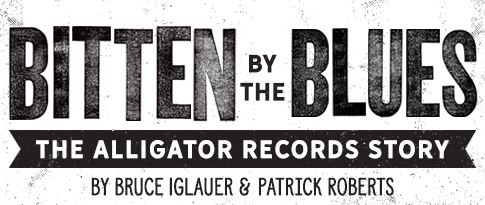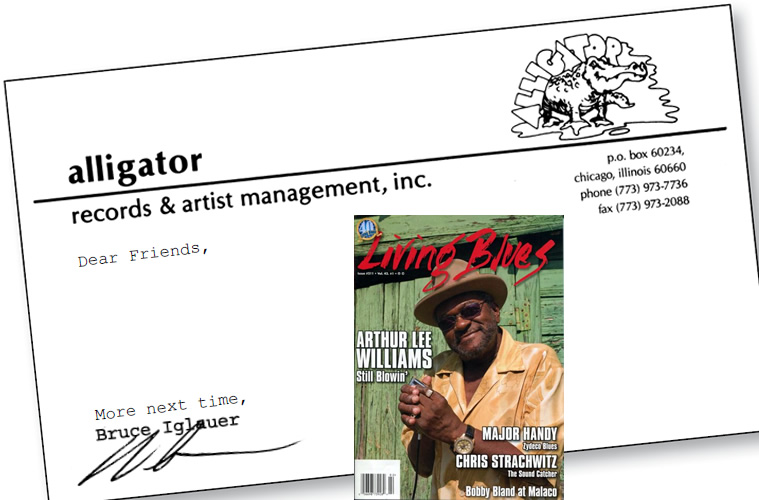Dear Friends,
Happy 2011! I’ve just finished preparing The Alligator Records 40th Anniversary Collection, which will be launched on February 22. It’s two discs, 38 songs, almost 160 minutes of music plus a handsome booklet written by yours truly, all for the price of a single CD. It was a very tough job choosing which songs to include, trying to pick some of the most exciting and soulful performances that exemplify the Alligator Story yesterday and today. I wanted to feature some of our earliest artists like Hound Dog Taylor, Son Seals and Koko Taylor and also newer members of the Alligator family like Tommy Castro, Janiva Magness and Anders Osborne. A big “thank you” to all those helpful fans on the Alligator email list who suggested their favorite tracks.
On February 22, we’ll be celebrating the Alligator legacy and pleasing those of you who love LPs by releasing new vinyl versions of three Alligator classics—our first album, Hound Dog Taylor & The HouseRockers, Buddy Guy and Junior Wells’ Alone & Acoustic (never before on vinyl in the U.S) and Showdown!, the masterpiece by Albert Collins, Johnny Copeland and Robert Cray. Along with them we’ll be offering a vinyl version of JJ Grey & Mofro’s 2010 album, Georgia Warhorse. On the same date we’ll present a remastered CD version of Showdown! that I think sounds even better than the original. Showdown! (both on CD and vinyl) and the Hound Dog LP both include a bonus track cut at the original sessions.
In late March we’ll be bringing you brand new music from one of Alligator’s most popular artists, Marcia Ball. The new record is called Roadside Attractions. It’s the first recording for which she’s written or co-written every song. The tunes range from New Orleans second line romps to two-fisted piano blues to passionate ballads. Marcia always immerses herself in her performances, but the fact that she wrote all the songs seems to give this album even a little more spark. It’s undoubtedly one of the best recordings of her long career.
Now, to wrap up the story of the final session for Cold Snap, Albert Collins’ 1986 album. Albert had never sung the last three songs before that day, but he had lived with tapes of them, taken either from the obscure original records or, in the case of Too Many Dirty Dishes, composer Johnny Nitro’s live performance. As usual, he hadn’t planned any of his solos except for perhaps some of the effects in Dirty Dishes. In the studio, he flew by the seat of his pants, reaching into his huge bag of signature licks and bends, delivered with his reverb-drenched icy attack. At one point, during Bending Like A Willow Tree, he played a run and then looked down at his hand to figure out what he had done. Albert could even surprise himself. During the same song, there was some confusion of signals and for a section Johnny Gayden stopped playing his bass and Allen Batts dropped out on organ. Casey and Mel kept on playing, and Albert just soloed on. We considered fixing the mistake, but decided that it sounded pretty cool with this big change in dynamics, like we had intended it, so we left it in.
As Dick Shurman was beginning to supervise the rundown of I Ain’t Drunk, the song that I had been asking Albert to record for two or three years, I headed out to pick up dinner for everyone. I figured it would take a little while for them to reacquaint themselves with the song, so I ran across the street for about 10 minutes. When I returned, eager to cut the song, I found that the band and Albert had been so ready that they had recorded it in two takes. I was hugely disappointed not to be there, but listening back, I had to admit that it was a terrific performance, full of Albert’s patented self-deprecating humor and with a simply kickass guitar solo.
In the end, Albert and these great musicians, with a little help from Dick and me, had created arrangements and solos and recorded terrific performances of three songs they had never played before, and they sounded damn good (and have passed the test of time). That’s what it was like to record Albert Collins.
More next time
Bruce Iglauer

